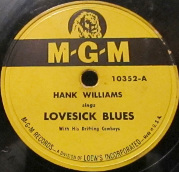
Hiram "Hank" Williams was an American singer, songwriter, and musician. Regarded as one of the most significant and influential American singers and songwriters of the 20th century, he recorded 55 singles that reached the top 10 of the Billboard Country & Western Best Sellers chart, including 12 that reached No. 1.

"Hey, Good Lookin'" is a 1951 song written and recorded by Hank Williams, and his version was inducted into the Grammy Hall of Fame in 2001. In 2003, CMT voted the Hank Williams version No. 19 on CMT's 100 Greatest Songs of Country Music. Since its original 1951 recording it has been covered by a variety of artists.
"Move It On Over" is a song written and recorded by the American country music singer-songwriter Hank Williams in 1947.
"I'm So Lonesome I Could Cry" is a song written and recorded by American country music singer-songwriter Hank Williams in 1949. The song has been covered by a wide range of musicians.

"Lovesick Blues" is a Tin Pan Alley song, composed by Cliff Friend, with lyrics by Irving Mills. It first appeared in the 1922 musical "Oh, Ernest", and was recorded that year by Elsie Clark and Jack Shea. Emmett Miller recorded it in 1925 and 1928, followed by country music singer Rex Griffin in 1939. The recordings by Griffin and Miller inspired Hank Williams to perform the song during his first appearances on the Louisiana Hayride radio show in 1948. Receiving an enthusiastic reception from the audience, Williams decided to record his own version despite initial push back from his producer Fred Rose and his band.

"I Saw the Light" is a country gospel song written by Hank Williams. Williams was inspired to write the song while returning from a concert by a remark his mother made while they were arriving in Montgomery, Alabama. He recorded the song during his first session for MGM Records, and released in September 1948. Williams' version did not enjoy major success during its initial release, but eventually it became one of his most popular songs and the closing number for his live shows. It was soon covered by other acts, and has become a country gospel standard.

"Kaw-Liga" is a country music song written by Hank Williams and Fred Rose.

Hank Williams' discography is composed of 31 singles and 2 ten-inch LPs released during his six-year career; as well as posthumous work including: singles, compilation albums and previously unreleased material. During his lifetime, Williams placed 30 songs on Billboard's Top C&W Records, while he had eleven number one hits.
"Take These Chains from My Heart" is a song by Hank Williams. It was written by Fred Rose and Hy Heath and was recorded at Williams' final recording session on September 23, 1952, in Nashville. The song has been widely praised; Williams' biographer Colin Escott deems it "perhaps the best song [Rose] ever presented to Hank...It was one of the very few songs that sounded somewhat similar to a Hank Williams song." Williams is backed by Tommy Jackson (fiddle), Don Helms, Chet Atkins, Jack Shook, and Floyd "Lightnin'" Chance (bass). In the wake of Williams' death on New Year's Day, 1953, the song shot to No. 1, his final chart-topping hit for MGM Records. Like "Your Cheatin' Heart," the song's theme of despair, so vividly articulated by Williams' typically impassioned singing, reinforced the image of Hank as a tortured, mythic figure.
"You Win Again" is a 1952 song by Hank Williams. In style, the song is a blues ballad and deals with the singer's despair with his partner. The song has been widely covered, including versions by Ray Charles, Jerry Lee Lewis, Roy Orbison, the Grateful Dead, Charley Pride, Bob Dylan, and the Rolling Stones.
"Honky Tonkin'" is a 1947 country music song, written and recorded by Hank Williams. His song went to #14 on the Billboard country music chart in 1948. In 1982, it became the sixth chart topping single for Williams' son, Hank Williams Jr.
"Alone and Forsaken" is a country song written and demoed by American musician Hank Williams. It has been since covered by many artists.
"My Heart Would Know" is a song written and recorded by Hank Williams. It was released as the B-side to "Hey Good Lookin'" in June 1951 on MGM Records.
On the Banks of the Old Ponchartrain is a song written by Hank Williams and Ramona Vincent. It was the singer's second single on MGM Records, released in September 1947.
"My Sweet Love Ain't Around" is a song written and performed by Hank Williams. It was his third single on MGM Records released in January 1948.
"I'm Sorry for You, My Friend" is a song written and recorded by Hank Williams. It was released as the flipside to his single "Honky Tonk Blues" in 1952 on MGM Records.
"Weary Blues from Waitin'" is a song written by Hank Williams. It was released as a posthumous single on MGM Records in 1953.

Memorial Album is the first Hank Williams LP issued by MGM Records after the singer's death on New Year's Day 1953.
"The Funeral" is a song credited to Hank Williams with words from Will Carleton. It was released as a single under the pseudonym Luke the Drifter by MGM Records in 1950.
"Rockin' Chair Money" is a song by Hank Williams. It was composed by Lonnie Glosson and Bill Carlisle.






